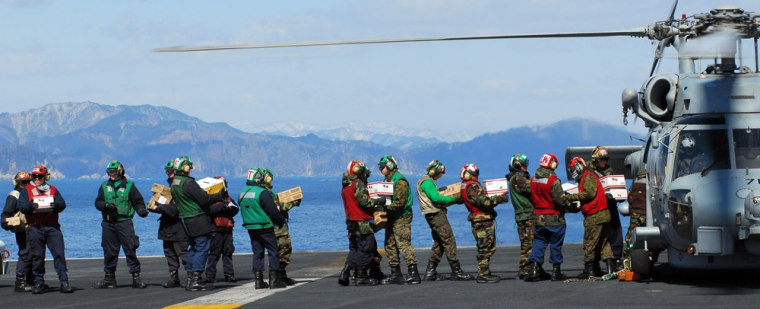As about 1,000 U.S. sailors began flying out of Japan on Friday, relatives in the United States expressed concerns about service members still in the country after last week's devastating earthquake and nuclear disaster.
The sailors — assigned to Carrier Air Wing 5, based at Atsugi Naval Air Facility, Japan — began flying their F/A-18 Super Hornets, EA-6B Prowlers and E-2C Hawkeyes out late Thursday to Andersen Air Force Base on the U.S. territory of Guam, about 1,500 miles away in the Pacific Ocean. An unspecified number of other sailors were also being relocated to bases on the island of Okinawa.
The sailors, their aircraft and an undetermined number of dependents will remain there indefinitely to clear the way for other U.S. military units better equipped to carry out intense search and rescue operations on the ground in Japan, said Lt. Jodie Cornell, a spokeswoman for the Navy.
It's emblematic of the massive U.S. response to the Japanese disaster. The Defense Department is dedicating so many service members to the relief effort that it's having to pull others out to make room — enough to fill all the available military housing on Guam and spill over to pack 11 hotels that have contracts with the Defense Department, said Mary Torre, president of the Guam Hotel and Restaurant Association.
Troops aiding with relief, cleanup
More than 17,000 of the roughly 49,000 U.S. service members in Japan have been assigned to the relief effort, the Defense Department said Friday, transporting tons of humanitarian supplies, clearing debris from flattened streets and neighborhoods, and providing high-pressure water pumps that are being used to help cool the critically damaged nuclear reactors at the Fukushima Dia-ichi plant.
But all of those 49,000 sailors, soldiers, airmen, Marines and Coast Guard members have families back home who have watched terrible scenes unfold in Japan over the last week, and many of them are afraid of what could happen to their uniformed loved ones.
From the moment she got a phone call from her sister telling her about the earthquake, Hortensia Palacios of Laredo, Texas, has been glued to the news. Her son, Marine Pfc. Richard Palacios Jr., 19, is assigned to Combined Arms Training Center at Camp Fuji in Gotemba.
"Just a couple of days ago, we were on the phone talking, and I heard his furniture rattle, and he kept saying, 'Oh Mom, oh Mom,'" said Hortensia Palacios, who said her biggest worry is the threat of radiation.
She said she prays every day for her son and hopes she can get a package to him for his 20th birthday next week.
Emotional swings for families Andrea Queen returned home to Jacksonville, Fla., a few weeks ago, leaving her husband, Jason Queen, a naval pilot assigned to Atsugi. Since the earthquake, she has been able to hear only on rare occasions from her husband, who has been deployed to the USS Mustin as part of the relief effort.
"It's scary. It's definitely not something that I try to think about a lot," she said. "He keeps reassuring me and telling me that everything's OK, so that makes me feel a little bit better."
For Queen and relatives of other service members in Japan, the scenes of devastation are hard to watch.
"I went from heartbroken to mad, I guess because I can't do anything and there are people that took such good care of me when I was there," she said. "It's driving me crazy being here and not knowing what's going on."
Lt. Cmdr. John Perkins, a spokesman for Joint Base Pearl Harbor Hickam in Hawaii, acknowledged that the relief assignments take a toll on family members, too — those who live in Japan full-time and those who visit their relatives in the service.
"We actually are part of those communities. Our families are part of those communities," Perkins said. "We talk about key alliances with Japan, but it's also a personal alliance, a one-on-one alliance that we have built up over years."
Keeping track on Facebook
Danielle Hubbard of Newport News, Va., is one of the thousands of military spouses who followed their husbands or wives to live in Japan. She and her two children are among the military dependents evacuating the country under the authorized departure order the U.S. government put out this week.
Hubbard and the kids were expected to leave Friday or Saturday. But her husband, a sailor assigned to Atsugi whom she preferred not to name, is remaining in Japan.
"I'm extremely worried for my kids knowing that my husband has to stay behind," she said. "They're preparing them with the mop suits — you know, for the radiation — so they'll be in full gear. It's pretty scary.
"Just knowing that your leaving your spouse behind because he's an active-duty military member is kind of upsetting," she said.Many families closely track postings on the military's various Facebook sites, where service members are occasionally given space to write about what's going on.
Cmdr. Julie Sellerberg, who is assigned to the Navy Region Southwest Complex in San Diego, wrote of the stress of knowing a spouse is in such a dangerous assignment. Her husband, Lt. Cmdr. Kurt Sellerberg, is executive officer of the USS Preble, which is flying round-the-clock relief missions from off the Japanese coast.
"It is often hard when he or I deploy because the ones we leave behind do not have a clear picture of what we are doing while we are gone," Julie Sellerberg wrote on the Navy's official blog.
But she added: "I am proud to be able to show my children photos from the USS Preble Facebook page or turn on the news and tell them that Daddy is there helping the people of Japan with humanitarian aid."
Alex Johnson is a reporter for msnbc.com. NBC stations KGNS of Laredo, Texas; KUAM of Guam; WAVY of Portsmouth, Va.; and WTLV of Jacksonville, Fla., contributed to this report.
